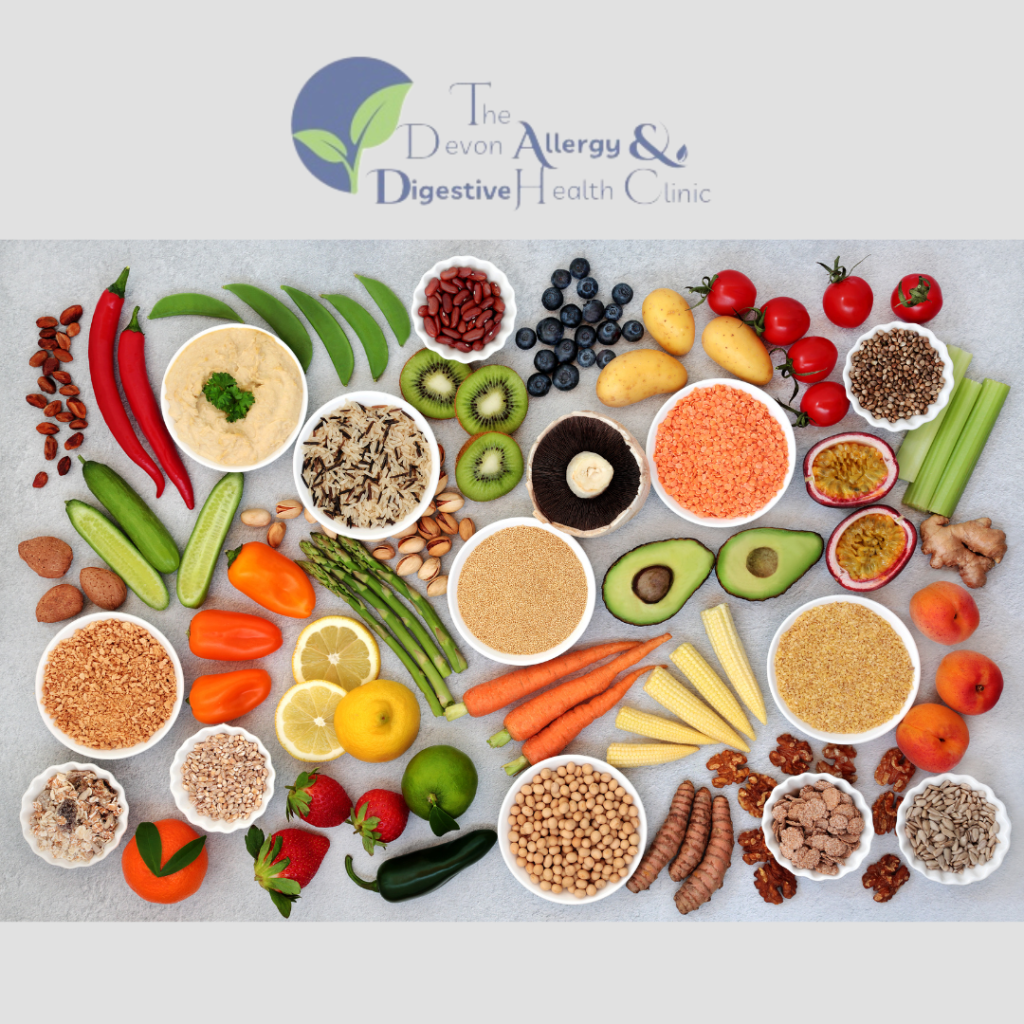What Should My Diet Include for Perfect Gut Health?

At The Devon Allergy and Digestive Health Clinic, we often get asked, “What should I eat for optimal gut health?” A well-balanced gut is vital for everything from digestion to immunity, mood, and overall well-being. Here’s a guide to building a gut-friendly diet that promotes a healthy and happy microbiome.
1. Prioritise Fibre-Rich Foods
Fibre is essential for gut health, feeding beneficial bacteria and promoting regular digestion. Aim to incorporate a variety of fibre sources:
- Fruits and Vegetables: Apples, berries, leafy greens, carrots, and squash.
- Whole Grains: Oats, quinoa, brown rice, and whole-grain bread.
- Legumes: Beans, lentils, chickpeas, and peas.
Tip: Adults should aim for around 25-30 grams of fibre per day. Gradually increase fibre in your diet to avoid bloating or discomfort.
2. Include Fermented Foods for Probiotics
Fermented foods are naturally rich in probiotics, which are beneficial bacteria that support gut health:
- Yogurt: Look for live cultures listed on the label.
- Kefir: A probiotic-rich dairy or non-dairy drink.
- Sauerkraut and Kimchi: Fermented vegetables with probiotics.
- Kombucha: A fermented tea that provides beneficial bacteria.
Tip: Start with small portions if you’re new to fermented foods, as they can cause gas or bloating in some people.
3. Prebiotic Foods: Feed Your Good Bacteria
Prebiotics are a type of fibre that feeds probiotics, helping them thrive in the gut. Add these prebiotic-rich foods to your meals:
- Garlic and Onions: Great for adding flavor and prebiotics.
- Bananas: A convenient source of prebiotics and potassium.
- Asparagus and Leeks: Great in soups, salads, or stir-fries.
- Whole Grains: Oats, barley, and wheat are also good prebiotic sources.
4. Hydrate!
Water is essential for digestion, nutrient absorption, and overall gut health. Staying hydrated helps move fibre through the digestive system and prevents constipation.
- Tip: Aim for 6-8 glasses of water daily, more if you’re active or during hot weather.
5. Healthy Fats: The Right Kind of Fuel
Fats play a role in gut health by supporting digestion and reducing inflammation.
- Avocado: A source of healthy monounsaturated fats.
- Olive Oil: Rich in anti-inflammatory properties.
- Nuts and Seeds: Great sources of omega-3 fatty acids, especially chia seeds, flaxseeds, and walnuts.
Tip: Use healthy fats in moderation to support your gut without causing digestive strain.
6. Limit Processed Foods and Added Sugars
Highly processed foods and added sugars can harm your gut health by promoting the growth of harmful bacteria.
- Swap Processed Snacks for Whole Foods: Try raw nuts, fruits, or yogurt instead of packaged snacks.
- Limit Sugary Drinks: Opt for water, herbal teas, or kombucha.
7. Experiment with Plant Diversity
Research suggests that eating a wide variety of plant-based foods can support a more diverse microbiome. Aim to eat 30 different plant foods each week:
- Tip: Mix up your grocery list and try new fruits, vegetables, whole grains, and legumes regularly.
8. Mind Your Portions and Eat Mindfully
Overeating can put stress on your digestive system, so practice mindful eating:
- Slow Down: Chew your food well and savor each bite.
- Listen to Your Body: Stop eating when you feel full.
Final Thoughts
Gut health is a journey, and every positive change can make a difference. Experiment with these foods, incorporate diversity, and listen to your body’s needs. If you have specific concerns or chronic digestive issues, consult our team at The Devon Allergy and Digestive Health Clinic for tailored advice and support.
Ready to transform your gut health? Contact us today to start your journey to a healthier, happier you!
